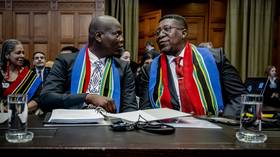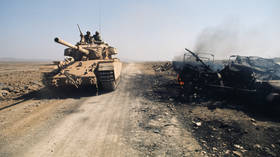This state took Israel to the court, but its citizens still join the IDF. Why?

Late last year, then-South African Foreign Minister Naledi Pandor issued a warning to her fellow citizens that they could face prosecution on returning home if they join the Israel Defense Forces (IDF). On December 29, she led her country’s delegation to the International Court of Justice (ICJ) to file a complaint accusing Israel of failing to uphold its obligations under the Convention on the Prevention and Punishment of the Crime of Genocide (commonly known as the Genocide Convention).
To Pandor, the entire Israeli war on the Gaza was simply genocide. Having fellow citizens join that war was a personal embarrassment and an awkward public position for a government that prides itself on being pro-Palestinian. After all it was South Africa, not any other country, which took Israel to the ICJ.
The case of Mr. Rattle
To Professor Usuf Chikte, representative of the Palestine Solidarity Campaign in South Africa, the government is not serious about the threat of accountability against citizens joining the IDF. In April, he filed a complaint against a fellow citizen by the name of Benjamin Rattle, accusing him of violating South African laws by fighting in Gaza. No action has been taken by the country’s National Prosecutor Authority – the judicial authority responsible for bringing cases to court.
Rattle reportedly posted on his Instagram page that he is “proud” to join the IDF. In another post, he wrote “from the river to the sea we shall set Israel free.” He also confirmed to South African news agency GroundUp that he was in Gaza before moving to northern areas where the IDF has been shelling Lebanon almost daily since October 7, 2023.
Like other IDF soldiers, Rattle seemed to enjoy sharing pictures of himself in military gear. Dozens of IDF soldiers, including foreigners, have unashamedly posted picture of themselves toying with Palestinian women’s underwear taken from destroyed homes. Professor Chikte also said that along with the complaint against Rattle, he submitted a list of 70 other individuals for the authorities to investigate for alleged human rights violations while working for the IDF.
Pretoria’s new foreign minister, Ronald Lamola, welcomed the ICJ’s July 19 advisory opinion declaring that aiding and abetting Israeli occupation, including in Gaza, is illegal and must end. This only increases the pressure on the South African government to deliver on its promise of accountability for citizens know to join the IDF.
Legal frames
Legally speaking, South African laws and the country’s constitution ban citizens from fighting in any foreign war without the express consent of the government. Above all, for South African citizens to join the IDF, already accused of genocide by the government, is an embarrassing contradiction casting doubts over Pretoria’s commitment to the accountability of such citizens.
Critics say Pretoria is not serious in its threat to hold citizens accountable for joining the IDF. Many point to the fact that the government knew as back as 2014 that its subjects were fighting with the IDF in Gaza. At least some 75 citizens took part in the 2014 war against Hamas in which nearly 3,000 Palestinians were killed, yet none of them has been held accountable. But many commentators believe it is different this time. The government of President Cyril Ramaphosa put itself under a glaring spot light the moment it filed the case against Israel. Many observers believe that not holding to account citizens who participate in the Gaza war was one of the reasons the long-ruling African National Congress (ANC) lost its majority in the May 29 elections, which happened for the first time in over 30 years.
Who is being recruited?
Most South Africans joining the IDF fall into three categories: first, dual citizens who are originally South Africans but have Israeli citizenship. Second, followers of the Jewish faith and, third, anyone sympathising with Israel – i.e. supporting its occupation of Palestinian territories and its war in Gaza. They usually make their way to Israel via a third country, which makes tracking them more difficult but not impossible.
While foreign fighters joining the IDF come from at least half a dozen countries, including the United States, the United Kingdom, France, the Netherlands, and Italy, South Africans are the only Africans known to have fought for Israel.There are, of course, Ethiopian followers of Judaism, particularly of the Falasha tribe, who were smuggled into Israel, out of Sudan, after being lured from Ethiopia back in the 1980s. They went on to become second-class citizens, as they continue to suffer discrimination from white and other citizens of Israel, but still have to serve in the IDF.
Recruiting programs
Since its inception, the IDF is built on the idea of foreign recruits. It runs several recruiting programs across the world, primarily targeting Jews, but also foreign citizens without excluding the followers of other faiths. Currently there are three active programs which the IDF calls “volunteer IDF Programs”: Sar-El, Marva, and Mahal, which has been the most successful and most enduring of the three. Each of the recruiting projects is designed for a particular group of volunteers. The common denominator between them is loyalty to Israel, meaning a volunteer must believe in a set of well-entrenched Zionist ideals, including denying the existence of the Palestinian people, believing that historical Palestine was in fact a land without people, rightly given to people without a land, and to a lesser degree the belief that Jews are God’s chosen people – these are the foundational bases of apartheid Israel.
The programs also work as a springboard for individuals wishing to become Israeli citizens, although they also welcome others who are interested to know about Israel and the IDF.
The Mahal project’s website offers details to people around the world who want to join the IDF, though the primary target of Mahal appears to be the United Kingdom. Any male British citizen aged 24 and over can sign up, while for female volunteers, the age threshold is 21 years old. Priority is given to people who have Jewish parents or grandparents. A rabbi, not a government institution, can certify that a volunteer is a Jew or a descendant of Jewish parents or grandparents.
In the current Gaza war, estimates say some 100 British soldiers are known to have been fighting in Gaza and at least three of them killed in combat. However, British paratrooper Sam Sank, who fought in Gaza, believes there are “hundreds if not thousands of fellow Brits are currently serving in the IDF.” As of 2016, the latest available figures, French volunteers are believed to make up the largest contingent of foreign fighters at about 45%, prompting French lawmaker Thomas Portes to ask the minister of justice last December to investigate them for “war crimes.” US soldiers make up about 29% of the total foreign recruits and the British at 5%. However, with the Israeli genocide in Gaza, it is likely that such numbers have increased considerably. Back in 2014, the UK parliament was petitioned to hold to account citizens who join the IDF, but no action has been taken so far.
In a TV talk show appearance, Italian Foreign Minister Antonio Tajani confirmed that 1,000 Italian nationals are performing different tasks for the IDF, including combat in Gaza. The number of American soldiers is not insignificant either, with the dual Israeli-American nationals making up the bulk of them.
Right after the current war erupted, some 10,000 individuals residing in the US received IDF notices requiring them to report for duty in Israel. They are a mix of US and Israeli citizens, Jews and non-Jews. Historically, and in any given year, some 1,200 Americans soldiers join the ranks of the IDF and take part in suppressing and shooting Palestinians in the occupied West Bank and East Jerusalem.
Mercenaries or not?
The basic definition of a mercenary is a person who fights in a foreign war expecting some financial gains. Foreigners who join the IDF do gain many financial benefits, including end of service pay, grants, and loans. Sometimes they make even more money than regular Israeli soldiers.
Many Western media outlets sometimes refer to foreign soldiers fighting for Israel as dual nationals of, for example, South Africa and Israel, and they are obliged to join the IDF. But in many cases, like South Africa, the US, and the UK, national laws bar citizens from joining foreign wars.
Generally speaking, Western media, big and small, hardly report on foreign fighters in the IDF and when they do, they never mention the term “mercenaries.” Yet the same media widely used the term to describe foreigners alleged to have fought on the side of Libyan and Syrian governments as they faced armed rebellions in 2011 mostly instigated and financed by the West. They also describe foreigners fighting on both sides in Sudan’s ongoing civil war as mercenaries but never use the same description of hundreds of American and European citizens who enlisted to fight in Ukraine against Russia, itself accused of recruiting foreign mercenaries.
Pretoria’s predicament
Will Pretoria and its new foreign minister, Ronald Lamola, who was appointed last month, deliver on the promise to arrest and prosecute citizens who join the IDF, or will it just look the other way despite its position on the Gaza war and the splash it made on the international scene by dragging Israel to the ICJ?
Going by previous precedents, Pretoria is unlikely to take action. The majority of South Africans are against the war in Gaza. Most of them supported the government when it took Israel to the ICJ. For the same government not to deliver on its promise of accountability might be a scandalous, morally contradictory position that the public cannot swallow. While the ICJ is yet to give its definitive ruling on Pretoria’s genocide case against Israel, the South African government finds itself in a difficult position and might be forced to act against its own citizens who are enlisted in the IDF ranks.
The statements, views and opinions expressed in this column are solely those of the author and do not necessarily represent those of RT.
https://www.rt.com/africa/601703-south-africa-gaza-genocide/




0 Comments:
Post a Comment
Subscribe to Post Comments [Atom]
<< Home